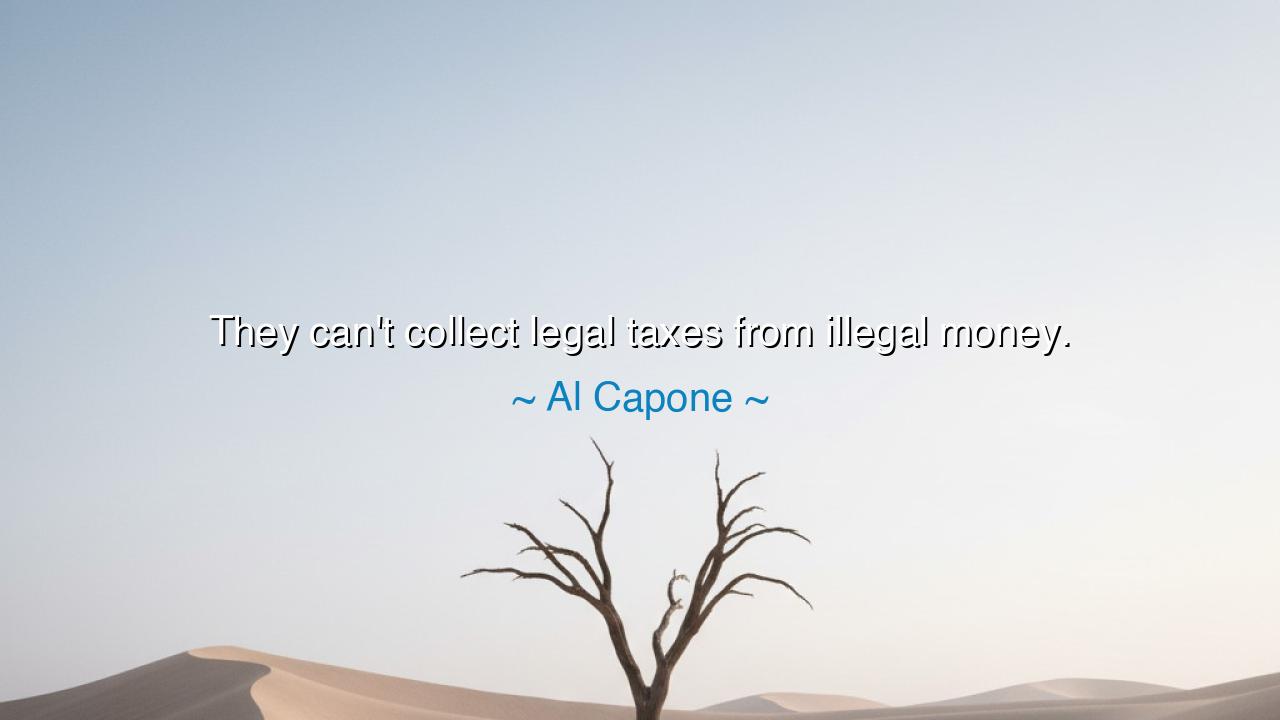
They can't collect legal taxes from illegal money.






In the chronicles of human society, few lessons are as stark and sobering as the tension between law and ambition. Al Capone’s words, “They can't collect legal taxes from illegal money,” cut to the heart of this tension, illuminating the ancient truth that what is gained through transgression lies beyond the reach of ordinary justice. Here is a reflection on morality, legality, and the fragile balance between power and consequence. Capone, a figure both feared and notorious, understood that wealth acquired outside the law cannot be legitimized merely by the apparatus of the state; it exists in a realm apart, subject to its own perils.
From the courts of ancient Rome to the trade networks of Renaissance Venice, rulers and magistrates wrestled with the challenge of illicit commerce. Merchants who flouted regulations and profited through clandestine trade often escaped the standard mechanisms of taxation, leaving authorities to devise new instruments of justice. Capone’s insight echoes this long-standing dilemma: the law can only claim what is lawful, and when wealth is rooted in illegality, conventional enforcement faces inherent limitations.
History offers chilling illustrations of this principle. In 18th-century England, smugglers of tea and spirits amassed fortunes beyond the grasp of the Crown’s tax collectors. Their cunning, secrecy, and disregard for law rendered ordinary fiscal measures ineffective. Only through extraordinary vigilance and the deployment of specialized agents could authorities reclaim some measure of control. Similarly, Capone’s empire thrived on prohibition-era liquor, gambling, and other illicit enterprises, defying legal taxation while flourishing in the shadows. His statement reveals a pragmatic understanding of the interplay between illegality and state power.
Yet, beneath the surface of this remark lies a moral lesson often overlooked. While the law may falter in collecting from illegal wealth, the consequences of transgression extend beyond mere taxation. Capone himself, eventually imprisoned not for his criminal empire but for tax evasion—a legal strategy that outflanked his illicit gains—demonstrates the enduring truth that no transgression escapes consequence indefinitely. The law may struggle against unlawful fortune, but ingenuity, hubris, and greed often court their own reckoning.
The philosophical undercurrent of Capone’s words speaks to a universal principle: illegality may offer short-term gain, but it carries inherent risk and instability. Societies are built upon predictable rules and norms, and while those who operate outside these structures may temporarily evade certain mechanisms, they also operate on fragile foundations. The ancients would have recognized the duality of fortune and risk, seeing wealth as both a tool and a test of character, with the moral and practical consequences intertwined.
In modern terms, Capone’s insight can serve as both caution and instruction. Financial or ethical shortcuts may appear to circumvent systems of accountability, yet in the long arc of history, patterns emerge: hidden wealth invites scrutiny, secrets invite betrayal, and unlawful acts invite eventual consequence. The impossibility of collecting legal taxes from illegal money underscores a fundamental truth: transgression isolates wealth from societal legitimacy, rendering it vulnerable to both legal and extralegal repercussions.
For individuals seeking guidance from this reflection, the lesson is clear: pursue wealth and achievement through lawful, ethical means. Recognize that shortcuts through illegality may evade immediate oversight, but they cannot secure enduring security, reputation, or honor. Invest in diligence, integrity, and transparency, ensuring that the fruits of labor are both lawful and sustainable. By doing so, one transforms effort into legitimate power, shielded not merely from taxation but from moral and societal jeopardy.
Thus, Al Capone’s words, though uttered from the shadows of infamy, carry the weight of timeless wisdom: illegal gain eludes ordinary legal mechanisms, yet it is never beyond the reach of consequence. Let this teaching serve as a cautionary echo across generations, reminding all that true security and enduring legacy are found not in evading law, but in aligning ambition with justice, prudence, and the enduring order of society.






AAdministratorAdministrator
Welcome, honored guests. Please leave a comment, we will respond soon